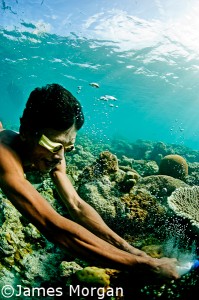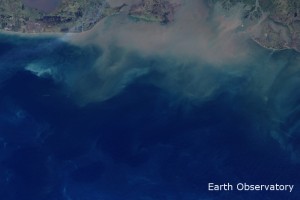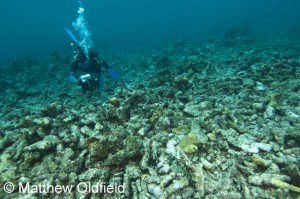Following on from our ‘introduction to corals‘ blog, I will continue to delve into their watery world, today approaching just some of the ways in which the world’s reefs are threatened.
In modern times, coral reefs are subject to threats from a variety of sources, ranging from global climatic changes to local destructive practices. Historically reefs have shown resistance to isolated pressures. However, as pressures on reefs continue to rise, many systems have become subject to numerous concurrent threats. A wealth of scientific research has produced causal data that proves the combined effects of global and regional stressors are proving too much for coral recovery.
As different reef ecosystems are subject to different threats, so the appropriate mitigation strategies must alter between regions. Nonetheless, most threats to reefs are recurrent at a range of locations. Here I will discuss the most globally significant pressures threatening reefs today.
Destructive fishing and over fishing.
Fishing represents the single largest pressure contributing to reef decline. Through these activities alone, 55% of the world’s reefs are threatened. Destructive fishing practices which employ techniques such as dynamite use or cyanide poisoning have immediate and disastrous effects on reef ecosystems. Along with other harmful practices, such as bottom trawling, these approaches kill or maim a wide range of non-target species and decimate vast swathes of ocean habitat.
- Cyanide fishing works by poisoning and paralysing all species within the application zone leaving fish paralysed and easy to retrieve. The reward for the reef for providing this bounty is fatal poisoning for itself and many of its inhabitants.
The practice of cyanide fishing, even on a small scale such as this, is devastating to coral environments. - Ocean trawling employs massive nets held down by large weights of perhaps several tonnes. These are dragged along ocean floors and obliterate ecosystems in their way. The level of by-catch from this fishing practice is also considerable, potentially outnumbering desired species catch by 10:1. This process causes similar damage to that of dynamite fishing, but on an astronomical scale (see below).
This incredible image shows the destruction resulting from ocean trawling as visible from space. Any wildlife in the way of these routes will be destroyed whilst surrounding areas will suffer from vast clouds of disturbed sediment which will block sunlight and smother bottom dwelling species upon resettlement. - Dynamite fishing kills fish via sending explosive shock waves through the water. This also reduces vast areas of coral to rubble, killing all species within the blast radius.
This previously diverse coral habitat has been reduced to lifeless rubble as a result of ‘dynamite fishing’.
Physical destruction of a reef reduces structure and habitat diversity and eliminates many of the microhabitats vital for species during breeding, courtship, hunting, and for refuge. Through entrapping or destroying a range of none target specimens or over-exploiting target species these practices can completely destroy marine ecosystems via local extinctions of ecologically important species. The loss of grazing species in particular (e.g. parrotfish or urchins) will allow harmful algal growth which outcompetes corals for access to resources such as sunlight.
The various practice of destructive fishing continue as they provide the exploiter with an immediate source of profit. However, the long term costs of such activities can be substantial. While fisher folk may be fully aware of the consequences of their actions, this is not always the case, and in many situations individuals are forced into over exploitation through poverty.
These are the challenges facing coral conservation.
For coral reef conservation efforts to succeed, individuals who rely on reefs for their income or to feed their families must be supported to sustainably manage this precious resource. Often such support must be financial, however social support, for example in the form of education is also important.
For coral reef conservation efforts to succeed, individuals who rely on reefs for their income or to feed their families must be supported to sustainably manage this precious resource. ZSL is supporting a number of projects that aim to encourage reef conservation, from helping EDGE Fellows such as Grace Quiton to carry out community-based conservation in the Philippines to helping establish the world’s largest no-take marine reserve, the Chagos Marine Reserve in the Indian Ocean, which will help to protect pristine coral reefs from the effects of over-fishing and destructive fishing techniques


